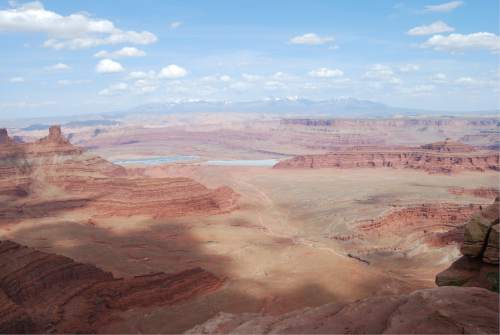This is an archived article that was published on sltrib.com in 2014, and information in the article may be outdated. It is provided only for personal research purposes and may not be reprinted.
Moab • And now there are seven.
Following a heated Grand County Council meeting Tuesday, council members voted to join other counties that are pooling their clout to amass funding for a highway to haul crude oil and other development seen as vital to the economic future of eastern Utah.
The council, in voting 6 to 1 to join the Seven County Infrastructure Coalition, overruled intense opposition from Moab and Castle Valley residents.
Critics see the move as an unwise and rushed marriage to counties bent on promoting fossil energy, even at the expense of the region's red rock beauty that draws tourists and outdoor adventurers to the canyon country carved out by the Green and Colorado rivers.
The issue has divided the community whose past is rooted in extraction but now harbors one of the nation's great recreation meccas.
Opponents packed the meeting room Tuesday night, sitting on the floor and crowding the hallway.
Many insisted the council wait until after the Nov. 4 election to make a decision, since coalition membership is a defining issue in all three council races.
But outgoing council member Gene Ciarus insisted membership was critical to influencing the new coalition's direction.
"Do we want to thrive and grow, or do we want to perish?" he asked.
Critics, including council candidates Chris Baird and Mary McGann, argued the coalition appears most interested in subsidizing oil and gas development.
"It is dangerous," said McGann, who is challenging council member Jim Nyland for his at-large seat. "If private industry is not doing it, there is a good reason. If they needed [infrastructure], they would build it."
In recent months, Grand and six adjacent counties privately crafted an "interlocal" agreement to form the coalition, which can pursue projects with the support of only three members. Emery, Duchesne, Uintah, Daggett, Carbon and San Juan county commissions all joined without much fuss.
Those counties have moved ahead as a six-county group and quickly secured $55 million in state community-impact funding toward a proposed $3 billion Uinta Basin railway to ship conventional crude and oil from prospective oil shale and tar sands mines. Many in Grand County want nothing to do with such a project.
Those and other concerns kept the Grand council from promptly signing the deal.
The underlying agreement enables Carbon, Duchesne and Uintah to form a voting bloc to hoard resources for energy-oriented projects, according to Moab attorney Christina Sloan. Grand needs veto power over any project that crosses its land, she and others say, but the agreement only provides that power over projects entirely within Grand's borders.
Sloan also says the deal needs greater clarity over how coalition assets can be transferred to third parties.
But a handful of citizens spoke in favor of joining, accusing critics of obstructionism and spreading misinformation and fear.
"It may not be a 100 percent perfect document, but it is certainly not dangerous or harmful. It is beneficial," Mary Knudson said. "I urge you to do your jobs, which is doing all in your power to build and maintain a healthy and diverse economy and promote jobs and affordable cost of living.
"None of us are under the delusion that oil and gas are going to be our savior in this economy, but tourism is also not a guarantee."
During a public comment period, 234 letters were submitted. Letters of opposition outnumbered those backing the idea by nine to one.
Council member Elizabeth Tubbs, who cast Tuesday's only "nay" vote, said the decision should be put to a referendum to determine how the county's 9,000 other residents feel.
"I am not against joining forces with our fellow counties, but I'm not in favor of forming another governmental entity," Tubbs said. "I don't believe the coalition's goals can only be accomplished by forming a governmental entity. They are usurping a lot of authority that should stay with us."
But council chairman Lynn Jackson said the county has little authority to give up, since it has no say over how federal and state land is managed. He assured a skeptical audience that the agreement has plenty of safeguards. Grand can exit the coalition anytime it wants and the coalition is forbidden from imposing debt on member counties without their consent, he said.
"This coalition is just learning how to walk. They are going to start with an inventory of all their infrastructure so they can make strategic decisions about how to proceed," Jackson said. "These aren't people who are going willy-nilly start building things without a good understanding.
"This coalition will take action whether we are part of it or not," he added. "If we are a member we can take part in their decision. We can help direct them rather than wonder what they are up to."



